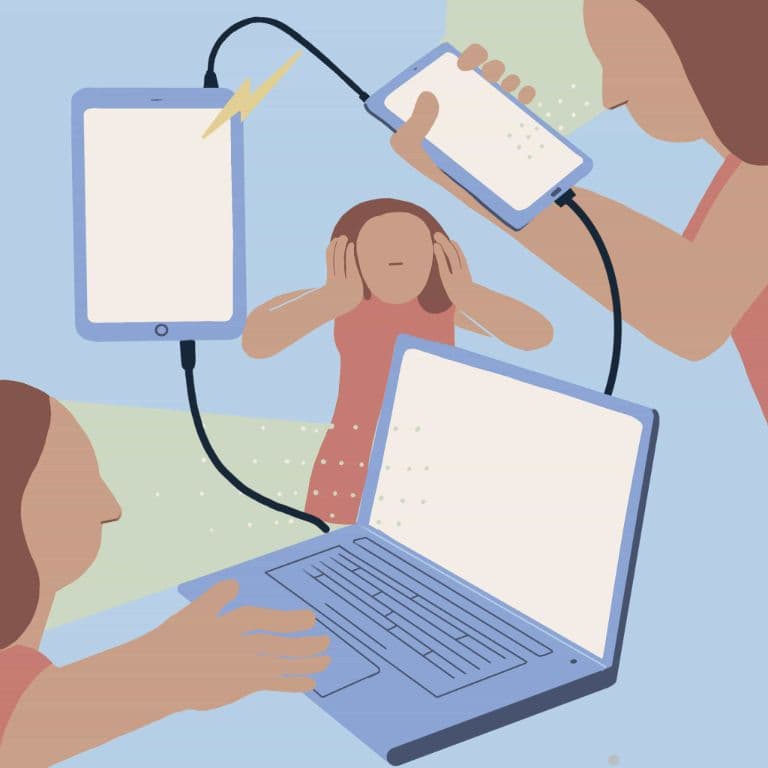We have become increasingly dependent on things such as laptops, mobile phones, reading devices and other technology to make our lives easier. And now, more than ever, we are using our devices to communicate, get information and remain in contact 24/7.
However, it is also a reality that the use of these devices, from being a means of communication or luxury or a matter of utility, has become almost an addiction for many of us.
This lends itself to feeling anxious or stressed when we don’t have that source close by at all times.
For example, Smartphone addiction, sometimes colloquially known as “nomophobia” (fear of being without a mobile phone), is often fueled by an Internet overuse problem or Internet addiction disorder.
We spend hours on these devices playing games, looking up social media, and other sites. This mindless addiction to devices has been termed as the addiction to any drug or equivalent to substance abuse. Whereas the addiction to substances is physical, the addiction to such devices like mobiles and laptops is known to be behavioural.
Addiction can be of many kinds and it can give birth to many problems - physical and psychological.
Adverse effects of device addiction
Excessive use of smartphones, paired with a negative attitude and feeling of anxiety and dependency on gadgets, may increase the risk of anxiety and depression.
Moreover, device addiction can also be one of the symptoms of underlying depression and anxiety. This is when the individual needs to consult a therapist or psychiatrist to get to the root of the problem. The physical effects include headaches, obesity, nausea, tension, hypertension and others.
There is also some data to suggest that the use of devices reinforces dopamine pathways, a neurotransmitter that is a “feel good” chemical involved in our reward-seeking behaviours. When this pathway isn’t reinforced, we actually experience chemical withdrawal in our brains.
Effects of excessive screen time and device addiction on children:
- Physical health: Obesity, sedentary lifestyle, disturbed sleep, headache, eye strain, neck, back, and wrist pains
- Mental health: Delayed speech, hyperactivity, aggression, violence, desire for instant gratification, poor concentration, fear of missing out, FOBLO (fear of being left out), cyberbullying, media addiction, distorted perception of sex by exposure to pornography, drug use, self-harm, anxiety, and depression
- Social: Reduced socialization and social anxiety
- Scholastic: Decreased academic performance
Cell phones, with or without addiction, can sabotage relationships!
When we are talking to someone and look at our watch or our phone, we are telling them that something has come to our attention that is more important than they are, and you are essentially rejecting them.
If we let our cell phones distract us during meals and quality time together, we aren’t able to be present, which then conveys to those involved that there is something happening that is more important than them.
It is important to stay present and if you do have to check your phone/device, make sure you are letting the other person know why, and creating and agreeing about expectations about checking the phone if that is needed.

How to detach from device deaddiction?
Data suggest that children and adolescents who spend more time on electronics do have increased rates of anxiety and depression.
However, they can be protected against this with more time outside and activities that don’t involve screens.
- Put limits on your use, and make sure you follow them.
- Make sure to put yourself on a “digital diet” and reduce the apps you use, remove them from your phone even!
- Cut back on the time you spend on your phone and put it away at certain times of the day so you aren’t tempted to use it.
- Setting up a very clear schedule for yourself, and your child can help too.
- As adults, we have to set rules for ourselves as well. Rules such as not using devices while walking, before going to bed, while exercising or during meals.
- Encourage the use of media for educational purposes and promote physical activity and offline creative games for recreation.
- Mark digital-free zones such as bedroom, dining table, kitchen, bathroom, and motorized vehicles where no family member uses a gadget.
- Decide upon a digital fasting time when no family member uses any device and utilizes that time for family bonding.
- Role model healthy media use and formulate a family media usage plan.
The Indian Academy of Paediatrics has formulated certain rules for children to reduce chances of device addiction:
- Children below the age of 2 years should not be exposed to any type of screen with the exception of occasional video calls with relatives.
- Screen time for children between the age of 2 and 5 years should not exceed 1 hour; the lesser, the better.
- For older children and adolescents, it is important to balance screen time with other activities that are required for overall development.
- These activities include an hour of physical activity (playtime), adequate duration of sleep (recommended sleep time varies with age, for example, adolescents require 8–9 hours of uninterrupted sleep at night), and time for schoolwork, meals, hobbies, and family time.
If any of these activities are displaced due to screen use, then it is called excessive screen time and it should be reduced.
When to consult a doctor?
If you still find yourself stuck in a vicious cycle of looking to your devices for connection, professional help should be taken.
Consult a professional as there are various behaviour therapies that aid in device deaddiction.
Most of all, have patience with yourself. Though the initial process might seem difficult, with time, you gain better control over yourself and the addiction.
Disclaimer: This information is educational and should not be construed as medical advice. Please consult your doctor before making any dietary changes or adding supplements.
ProactiveForHer is a digital clinic for women, offering accessible, personalised, and confidential healthcare solutions. We offer out-patient care, diagnostic services and programs for various health concerns of Indian women, across their lifetime - from puberty to pregnancy to menopause.

